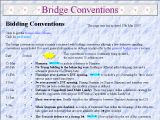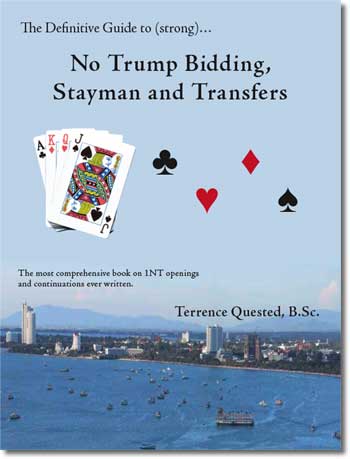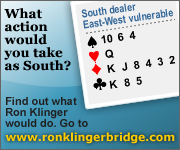Mon 9th 1st Jeremy & Sally 63% 2nd Bob P & Robbie 61%
Wed 11th 1st Hans V & Janne 62% 2nd Paul Q & Terry Q 59%
Fri 13th 1st Hans V & Paul Q 63% 2nd Dave C & Ivy 58%
| to news-sheet main page |
 |
||||
| to Pattaya Bridge home page |
|||||
 |
to bridge book reviews | to bridge conventions | to No Trump bidding | ||
| to bridge CD's and computer games and software | |||||
Bidding Quiz Standard
American bidding is assumed unless otherwise stated.
Hand A Hand B With Hand
A RHO opens 1♥, what do you bid?
♠ AQ1085 ♠ AJ7
♣
Q10 ♣ A7
Hand C Hand D With Hand
C RHO opens 1♠, what do you bid?
♠ KQ32 ♠ KQ43
♣
7 ♣
AJ103
♠ 4 ♠ AKQJ10872
♥ A2 ♥ AKQJ
♦ AKQJ9 ♦ - What
do you open with Hand D and what is you plan in the
♣
KJ532 ♣ K bidding?
G 3♠ 3NT
is this 3NT overcall
here unusual (minors) or something else?
Current club championship standings
|
|
Gold Cup = Best 30 |
Silver Plate = Best 10 |
Bronze Medal = Best 5 |
|
1 2 3 4 5 6 7 8 9 10 |
1880.2 Janne Roos 1864.0 Hans Vikman 1860.7 Paul Quodomine |
669.2 655.4 640.1 628.3 Sally Watson 626.8 Tomas Wikman 619.8 Lars Broman 615.9 Jean Wissing 610.7 Johan Bratsburg 610.0 Derek & Gerard 609.5 Duplessy & Coutlet |
344.6 337.6 329.6 Tomas Wikman 325.4 323.4 322.9 Lars Broman 322.7 Derek & Gerard 320.3 Jean Wissing 319.5 Duplessy & Coutlet 316.0 Sigurd Zahl |
Silly ‘take-out’ doubles – part 1 Board 3 from Monday 9th August
Dealer: ♠ KJ764 West(A) North East South
South ♥ 4 - - - 1♥
E-W vul ♦ 1073 dbl (1) 1NT (2) pass 2♥
♣
K743 2♠ (3) pass (4) pass 3♥ (5)
♠ AQ1085 N ♠ 3
♠ 92
♥
AQJ963
♦ 652
♣ A2
And what happened? 3♥ went -2 for the only + score to E-W, 2♠ goes down of course.
Silly ‘take-out’ doubles – part 2 Board 22 from Monday 9th August
Dealer: ♠ 1053 West North East South(B)
East ♥ 103 - - 1♠ dbl (1)
E-W vul ♦ A104 pass 2♣ 2♥ 2NT (2)
♣
KJ852 all pass
♠ 9 N ♠ KQ8642 (1) What did you bid with this South hand B(a) in
♠ AJ7 (2) What did you bid with
this South hand B(b) in
♥
QJ95 this
week’s quiz? Obviously you should not be
♦ J1065 in
this predicament, but pass is clear. This 2NT
♣ A7 bid
shows a hand too good for a 1NT overcall in most people’s style.
And what happened? South got his asked-for
bottom when 2NT went one down. 2♠-1
by East was the popular contract. The bottom line: South said that he was not
strong enough to overcall 1NT (but bidding 2NT over partner’s minimal response
was acceptable?).
Silly ‘take-out’ doubles – part 3 Board 22 from Monday 9th August
Dealer: ♠ AJ974 West North East(C) South
North ♥ QJ - 1♠ dbl (1) 1NT
E-W vul ♦ 872 all pass
♣
KQ4 all
pass
♠ 106 N ♠ KQ32 (1) What did you bid with this East hand C in
♠ 85
♥
A108
♦ K95
♣ 109652
And what happened? West led a ♣, quite reasonable if East really had a
take-out double, and South made the contract for a joint top.
Silly ‘take-out’ doubles – Summary
This article was prompted by North’s dubious question in part one. But, he does have a point! Everybody is entitled to know any deviations from ‘standard’ in the opponents’ agreed bidding. Apparently Robbie (part 2) and Sally (part 3) play that a double simply shows opening values. THI S IS NOT ‘STANDARD’. Of course you can play whatever system you like, but any agreements that deviates from what is ‘standard’ need to be alerted. So, if you adhere to this policy of making a take-out double simply to show points, then this NEEDS TO BE ALERTED by your partner, this new rule was agreed to by the club’s senior players.
What is generally played as a take-out double is on the web-site in the beginner’s bidding section. Basically it should be either:
a) Short (0,1 or 2) in the suit opened and playable (3+ cards) in the three unbid suits.
b) A single suited hand too good for a simple overcall
c) A NoTrump hand too good for a 1NT overcall.
If your partner frequently deviates from this then the double needs to be alerted. Take out doubles in the pass-out seat may be any shape and need not be alerted. Also take-out doubles of pre-empts may be any shape as there is not that much bidding space for alternative bidding.
Dave’s Column Here
is Dave’s 1st problem, on the play of the hand.
♠
KQ43 ♠ AJ1098 West North East South
♥ 986 ♥ 73 1♥ pass 2♥ 2♠
♦ 87 ♦ KJ pass 4♠ all pass
♣
AJ103 ♣ Q984
You are South, declarer in 4♠. West leads a top ♥ and East encourages. West continues with the ♥4 to East’s ♥Q. East switches to the ♦2.
What is the ♥ position and which ♦ do you play?
Dave’s Column
Answer Board 16 from Wednesday 11th
August
Dealer: ♠ KQ43 Book Bidding
West ♥ 986 West North(D) East South
E-W vul ♦ 87 1♥ pass 2♥ 2♠
♣
AJ103 pass 4♠ (1) all
pass
♠ 52 N ♠ 76 (1) What did you bid with this North hand D in this
♠ AJ1098 alternative and 3♠ shows
a much weaker hand.
♥
73
♦ KJ West leads a top ♥
and East encourages. West continues
♣ Q984 with
the ♥4 to East’s ♥Q. East switches to the ♦2.
What is the ♥ position and which ♦ do you play?
If West has both ♦ honours you have no
chance, so you must assume that East has one of the honours. Try to envision a
layout of the opponents’ cards that will justify their bidding or non-bidding.
Your first thought is that West must have the ♦A for his 1♥ opening in first seat. That is a reasonable
place to start. Can you read the ♥
position with any confidence? Yes, you can. West surely has the ♥AK, probably also with the ♥J (East did not play it) and East had the ♥Q. What about the ♣K? , which is clearly important to you? There
is no guarantee involved, but you have to assume that West has the ♣K for you to have any chance of making the
contract. Once you credit West with ♣K,
can he also hold the ♦A?
The answer is ‘almost certainly not’. If West has the ♦A, he has a nice aces and kings and decent
trumps (AKJxx ) 15 point hand that would either have opened 1NT or would surely
compete to 3♥, rather than risk selling out to 2♠. And that would leave East with nothing more
than the ♥Q and ♦Q,
a hand that would not normally merit a raise to 2♥.
So play the ♦K with confidence
that your detective work has paid off.
And what happened at the Pattaya bridge club? Nobody bid game: 3♠*=, 3♠+1
four times.
Terry comment. I don’t
really like the inference and comment “or compete to 3♥”. With aces and kings, good defensive cards, I
see no reason for West to compete above the LAW.
Dave’s 2nd
Column Here
is Dave’s 2nd problem, again on declarer play.
West East Book
Bidding
♥ 7652 ♥ AK3 - 1♠ 2♦ 2♠
♦ K107 ♦ AJ9864 3♦ 3♠ 5♦ all pass
You are East, declarer in 5♦. South leads a low ♠ to North who takes the first two tricks with
the ♠Q and ♠A.
he shifts to the ♥J which you win. Plan the play.
Note from the book. If you can get this one, you are wasting your
time at your regular job. There’s a national team somewhere saving a place just
for you.
Dave’s 2nd Column Answer Board 17 from Wednesday 11th
August
Dealer: ♠ AKQ764 Book Bidding
North ♥ J10 West North East South
Love all ♦ Q32 - 1♠ 2♦ 2♠
♣
J9 3♦ 3♠ 5♦ all pass
♠ 85 N ♠ 103
♠ J92
♥
Q984 South leads a low ♠ to North who takes the first two
♦ 5 tricks with the
♠Q and ♠A.
He shifts to the ♥J which
♣ Q10752 you
win. Plan the play.
♠ - N ♠ - You lead the ♦6, if South
throws a ♥ then you
♠ -
♥
Q9
♦ -
And what happened at the Pattaya bridge club? 3♠=, 4♦=,
4♦-1 and 5♦-2
twice.
The 4NT opening
♠ AKQJ10872 What did you open with Hand F in this week’s quiz?
♥ AKQJ Of course you can use the
4NT for anything you like, but one common
♦ - treatment
is to ask for specific aces. See just how great the bid is with
♣ J this hand! If partner has no ace you want to be in 6♠, if he has the ♦A you still want to be in 6♠, if he has the ♣A you want be in 7♠ and if he has both aces you want to be in 7NT.
The responses to this 4NT opening are: 5♣ = no ace
5♦/♥/♠/6♣ = that ace
5NT = two aces.
The only bad thing about this treatment is that it never comes up!
Dave put these two deals, from an Australian simultaneous, when he was sitting
out on the first round.
Dave’s 3rd
Column Board 18 from Wednesday 11th August
Dealer: ♠ 864 Recommended Bidding
East ♥ J982 West North East South
N-S vul ♦ 6 - - 3♦ 4♥
♣ A10986 6♦ 6♥ pass pass
7♦ dbl (1) all pass
♠ 10972 N ♠ J3
♠ AKQ5 pass situation
(the way that Paul Q and I,
♥
AKQ7543 and
I believe most, play it). To pass here
♦ Q would show 1st round ♦ control and so
♣ 7 this
double denies 1st round control.
Bidding: The 3♦ opening gives South a nasty problem. 4♥ is certainly a sensible choice, even if a bit
conservative. West correctly up the anti with a sacrificial bid of 6♦. As North, what do you do? You might shut your
eyes and advance 6♥. You are set for a good score because 6♥ makes but West might save in 7♦ which
goes down four if South gets a ♣
ruff.
Play: Against a ♥ contract the
defence must lead a ♦ if they want to
take a trick.
And what happened at the Pattaya bridge club? 6♥= twice, 4♥+2
and 7♦*-3 twice.
Dave’s 4th
Column Board
19 from Wednesday 11th August
Dealer: ♠ K Recommended Bidding
South ♥ A97 West North East South
E-W vul ♦ KJ62 - - - 1♦
♣ KJ1085 pass 2♣ pass 2NT
pass 3♦ pass 3♥
♠ A1082 N ♠ QJ974 pass 4♥ all pass
♠ 653
♥
QJ43
♦ AQ83
♣ A7
Bidding: 3NT by North fails on the obvious ♠ lead but 3NT by South will surely succeed – West can hardly lead the ♠A. On the bidding given 3♦ is forcing, with invitational strength North
would bid 3♦ directly. South bids 3♥ to indicate a ♠ problem so North opts for the 4-3 ♥
fit.
Play: West leads a trump, ducked to the ♥K and the ♥A wins the return. Declarer must now set up ♣’s. Even running a ♣ to West’s ♣Q is OK. Now declarer must get his 10 tricks.
And what happened at the Pattaya bridge club?
3NT= three times, 3NT-1 and 3NT-2.
Janne’s Column Alerts
I’ve been playing at this club for about four years and I have seen many pairs alert properly and some never alert. As bridge is a very honest game and some people perhaps don’t know when to alert I’ll give you some advice; actually it is very simple. Every time that you get information that is not obvious to the opponents you must alert. Every conventional bid must be alerted if it’s not standard in the club. For example, 1NT - pass - 2♣ or 1NT - pass - 2♦ do not need alerting if they are the standard Stayman/transfer resp.
But 1♥ - pass - 2♠ must be alerted. Some play this jump shift as weak in ♠’s, some strong and myself showing short ♠’s and ♥ support. You know what it means but the opponents don’t. There are so many more situations but try to remember that when you get information that the opponents maybe don’t please alert. It’s never wrong to do it.
How high should you alert? It has changed during the years but it is not so important. I suggest up to 4♦. If partner gives a wrong explanation of the alert you are not allowed to correct him but inform the opponents before the opening lead if your side is declaring; if your side is defending then you can say nothing until the hand is over.
Angelic
play
Now for something completely different. Linda has come back from
Board 4 from Wednesday 11th August
Dealer: ♠ K54
West ♥ J875 Bidding
both vul ♦ 105 West North East South
♣
J1075 (Gus) (me-Janne) (Linda) (Hans)
♠ AJ1032 N ♠ 8 pass 3♣ pass pass
♥
9
♦ AJ94
♣ AK84
Hans led the ♣AK and then a ♠. Linda won with the ♠A and ruffed a ♠. Then she ruffed a ♣ and played the ♦Q which Hans won, returning a ♠. Linda Ruffed and played the ♦K and one more. Hans won and played his last ♦. Linda ruffed with the ♥A and I had to under-ruff. Then Linda led a ♠ and ruffed with the ♥10 and then she had nine tricks, losing just two ♦’s and two ♣’s. I made none of my trumps. Linda never played trumps and that was perfect. Very well done Linda.
<end of Janne’s Column>
Pre-emptive bids.
♠ 10xxxx We have recently introduced the ‘Australian
rule of 15’ for pre-emptive
♣
Ax a
pre-empt is acceptable. I am willing to stretch this to 14 for 2-level pre-
empts but three level (or 2NT if you play that)
need to be 15. Janne informed me that one player overcalled with a Michaels
with this hand. I would never dream of doing this (with zero points in the two
suits) but it is only 13 for the rule of 15 and so not allowed. The only
exception is the weak jump shift which may be extremely weak.
Bidding Quiz Answers
G 3♠ 3NT
The 3NT overcall here is natural
(with a ♠ stop).


